An Analysis of the Evolution of Accounting Information System
VerifiedAdded on 2022/10/15
|20
|5388
|30
Report
AI Summary
This report provides a comprehensive overview of the evolution of Accounting Information Systems (AIS). It begins with an introduction to AIS and its role in transforming economic data into financial information. The discussion covers the evolution of AIS through different eras, including the 90s, 00s, and 2010s, highlighting the shift from basic accounting software to SaaS, ERP systems, cloud computing, and mobile applications. The report explores the rationale behind adopting AIS, including globalization and increased business complexities. It further examines traditional AIS, its subsystems, and the relationship between AIS and organizational effectiveness. The report also delves into the impact of AIS on management accounting tasks and techniques, strategic control, and the challenges faced with the evolution of AIS. It concludes by discussing the accounting benefits of adopting business process-oriented AIS and suggests areas for further study, offering a complete analysis of the AIS landscape.
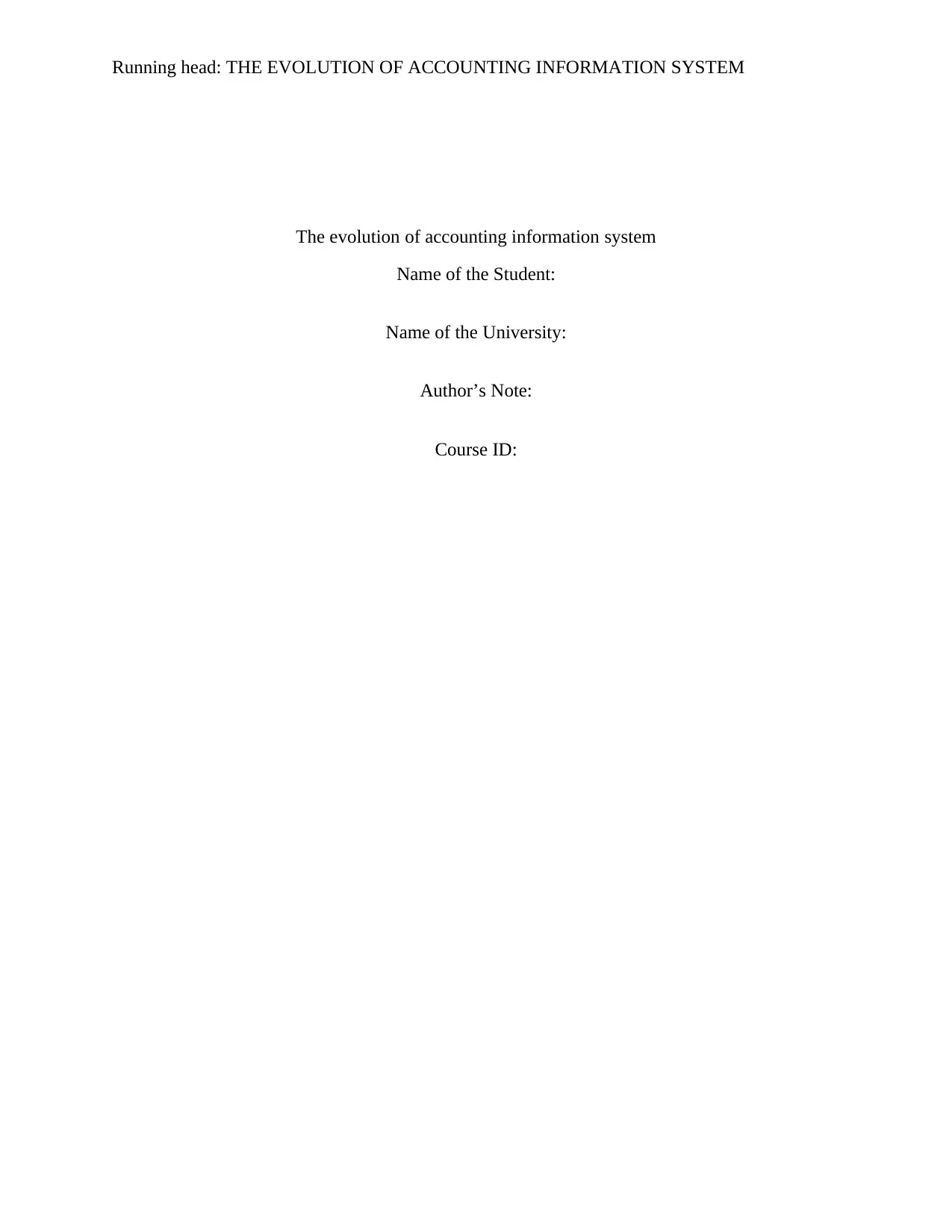
Running head: THE EVOLUTION OF ACCOUNTING INFORMATION SYSTEM
The evolution of accounting information system
Name of the Student:
Name of the University:
Author’s Note:
Course ID:
The evolution of accounting information system
Name of the Student:
Name of the University:
Author’s Note:
Course ID:
Paraphrase This Document
Need a fresh take? Get an instant paraphrase of this document with our AI Paraphraser
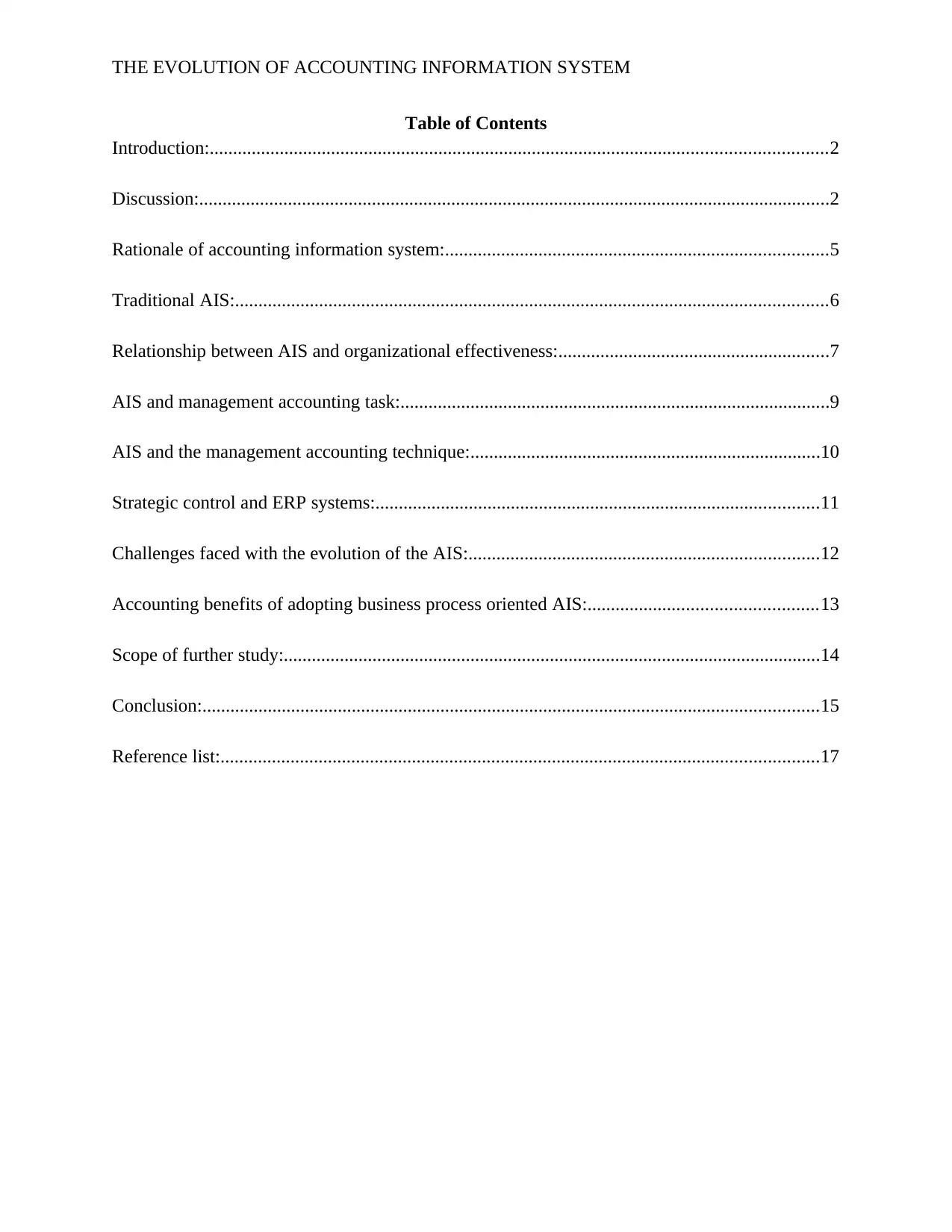
THE EVOLUTION OF ACCOUNTING INFORMATION SYSTEM
Table of Contents
Introduction:....................................................................................................................................2
Discussion:.......................................................................................................................................2
Rationale of accounting information system:..................................................................................5
Traditional AIS:...............................................................................................................................6
Relationship between AIS and organizational effectiveness:..........................................................7
AIS and management accounting task:............................................................................................9
AIS and the management accounting technique:...........................................................................10
Strategic control and ERP systems:...............................................................................................11
Challenges faced with the evolution of the AIS:...........................................................................12
Accounting benefits of adopting business process oriented AIS:.................................................13
Scope of further study:...................................................................................................................14
Conclusion:....................................................................................................................................15
Reference list:................................................................................................................................17
Table of Contents
Introduction:....................................................................................................................................2
Discussion:.......................................................................................................................................2
Rationale of accounting information system:..................................................................................5
Traditional AIS:...............................................................................................................................6
Relationship between AIS and organizational effectiveness:..........................................................7
AIS and management accounting task:............................................................................................9
AIS and the management accounting technique:...........................................................................10
Strategic control and ERP systems:...............................................................................................11
Challenges faced with the evolution of the AIS:...........................................................................12
Accounting benefits of adopting business process oriented AIS:.................................................13
Scope of further study:...................................................................................................................14
Conclusion:....................................................................................................................................15
Reference list:................................................................................................................................17
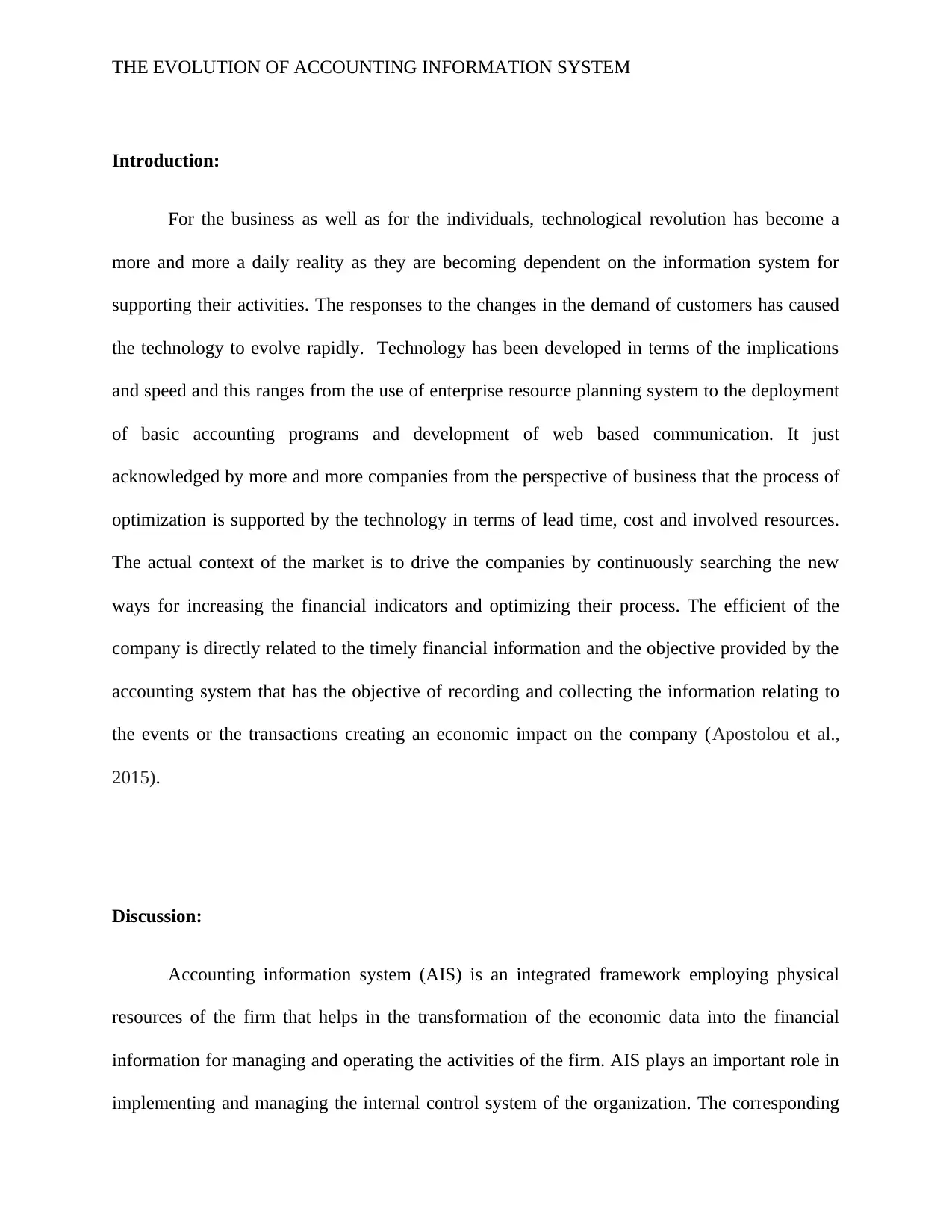
THE EVOLUTION OF ACCOUNTING INFORMATION SYSTEM
Introduction:
For the business as well as for the individuals, technological revolution has become a
more and more a daily reality as they are becoming dependent on the information system for
supporting their activities. The responses to the changes in the demand of customers has caused
the technology to evolve rapidly. Technology has been developed in terms of the implications
and speed and this ranges from the use of enterprise resource planning system to the deployment
of basic accounting programs and development of web based communication. It just
acknowledged by more and more companies from the perspective of business that the process of
optimization is supported by the technology in terms of lead time, cost and involved resources.
The actual context of the market is to drive the companies by continuously searching the new
ways for increasing the financial indicators and optimizing their process. The efficient of the
company is directly related to the timely financial information and the objective provided by the
accounting system that has the objective of recording and collecting the information relating to
the events or the transactions creating an economic impact on the company (Apostolou et al.,
2015).
Discussion:
Accounting information system (AIS) is an integrated framework employing physical
resources of the firm that helps in the transformation of the economic data into the financial
information for managing and operating the activities of the firm. AIS plays an important role in
implementing and managing the internal control system of the organization. The corresponding
Introduction:
For the business as well as for the individuals, technological revolution has become a
more and more a daily reality as they are becoming dependent on the information system for
supporting their activities. The responses to the changes in the demand of customers has caused
the technology to evolve rapidly. Technology has been developed in terms of the implications
and speed and this ranges from the use of enterprise resource planning system to the deployment
of basic accounting programs and development of web based communication. It just
acknowledged by more and more companies from the perspective of business that the process of
optimization is supported by the technology in terms of lead time, cost and involved resources.
The actual context of the market is to drive the companies by continuously searching the new
ways for increasing the financial indicators and optimizing their process. The efficient of the
company is directly related to the timely financial information and the objective provided by the
accounting system that has the objective of recording and collecting the information relating to
the events or the transactions creating an economic impact on the company (Apostolou et al.,
2015).
Discussion:
Accounting information system (AIS) is an integrated framework employing physical
resources of the firm that helps in the transformation of the economic data into the financial
information for managing and operating the activities of the firm. AIS plays an important role in
implementing and managing the internal control system of the organization. The corresponding
⊘ This is a preview!⊘
Do you want full access?
Subscribe today to unlock all pages.

Trusted by 1+ million students worldwide
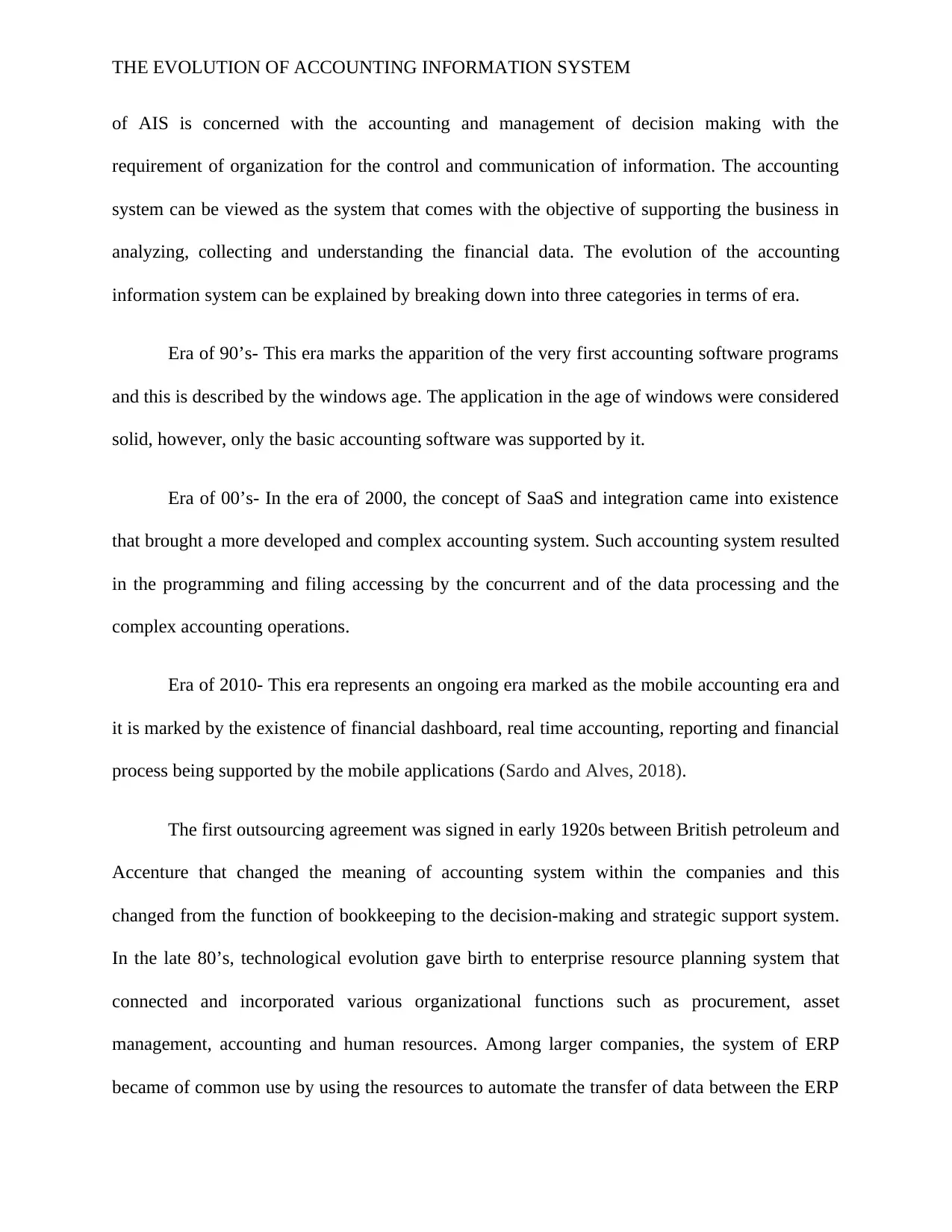
THE EVOLUTION OF ACCOUNTING INFORMATION SYSTEM
of AIS is concerned with the accounting and management of decision making with the
requirement of organization for the control and communication of information. The accounting
system can be viewed as the system that comes with the objective of supporting the business in
analyzing, collecting and understanding the financial data. The evolution of the accounting
information system can be explained by breaking down into three categories in terms of era.
Era of 90’s- This era marks the apparition of the very first accounting software programs
and this is described by the windows age. The application in the age of windows were considered
solid, however, only the basic accounting software was supported by it.
Era of 00’s- In the era of 2000, the concept of SaaS and integration came into existence
that brought a more developed and complex accounting system. Such accounting system resulted
in the programming and filing accessing by the concurrent and of the data processing and the
complex accounting operations.
Era of 2010- This era represents an ongoing era marked as the mobile accounting era and
it is marked by the existence of financial dashboard, real time accounting, reporting and financial
process being supported by the mobile applications (Sardo and Alves, 2018).
The first outsourcing agreement was signed in early 1920s between British petroleum and
Accenture that changed the meaning of accounting system within the companies and this
changed from the function of bookkeeping to the decision-making and strategic support system.
In the late 80’s, technological evolution gave birth to enterprise resource planning system that
connected and incorporated various organizational functions such as procurement, asset
management, accounting and human resources. Among larger companies, the system of ERP
became of common use by using the resources to automate the transfer of data between the ERP
of AIS is concerned with the accounting and management of decision making with the
requirement of organization for the control and communication of information. The accounting
system can be viewed as the system that comes with the objective of supporting the business in
analyzing, collecting and understanding the financial data. The evolution of the accounting
information system can be explained by breaking down into three categories in terms of era.
Era of 90’s- This era marks the apparition of the very first accounting software programs
and this is described by the windows age. The application in the age of windows were considered
solid, however, only the basic accounting software was supported by it.
Era of 00’s- In the era of 2000, the concept of SaaS and integration came into existence
that brought a more developed and complex accounting system. Such accounting system resulted
in the programming and filing accessing by the concurrent and of the data processing and the
complex accounting operations.
Era of 2010- This era represents an ongoing era marked as the mobile accounting era and
it is marked by the existence of financial dashboard, real time accounting, reporting and financial
process being supported by the mobile applications (Sardo and Alves, 2018).
The first outsourcing agreement was signed in early 1920s between British petroleum and
Accenture that changed the meaning of accounting system within the companies and this
changed from the function of bookkeeping to the decision-making and strategic support system.
In the late 80’s, technological evolution gave birth to enterprise resource planning system that
connected and incorporated various organizational functions such as procurement, asset
management, accounting and human resources. Among larger companies, the system of ERP
became of common use by using the resources to automate the transfer of data between the ERP
Paraphrase This Document
Need a fresh take? Get an instant paraphrase of this document with our AI Paraphraser
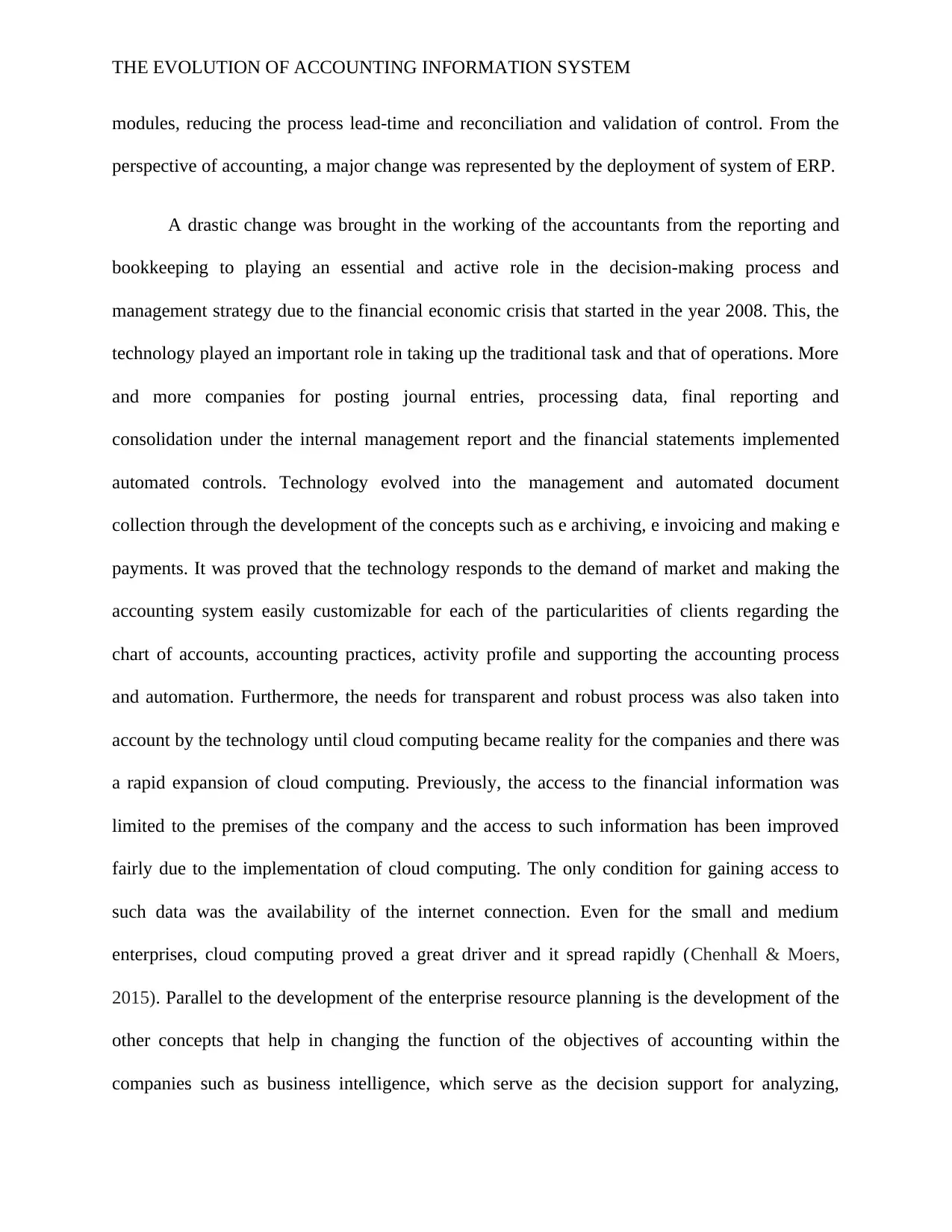
THE EVOLUTION OF ACCOUNTING INFORMATION SYSTEM
modules, reducing the process lead-time and reconciliation and validation of control. From the
perspective of accounting, a major change was represented by the deployment of system of ERP.
A drastic change was brought in the working of the accountants from the reporting and
bookkeeping to playing an essential and active role in the decision-making process and
management strategy due to the financial economic crisis that started in the year 2008. This, the
technology played an important role in taking up the traditional task and that of operations. More
and more companies for posting journal entries, processing data, final reporting and
consolidation under the internal management report and the financial statements implemented
automated controls. Technology evolved into the management and automated document
collection through the development of the concepts such as e archiving, e invoicing and making e
payments. It was proved that the technology responds to the demand of market and making the
accounting system easily customizable for each of the particularities of clients regarding the
chart of accounts, accounting practices, activity profile and supporting the accounting process
and automation. Furthermore, the needs for transparent and robust process was also taken into
account by the technology until cloud computing became reality for the companies and there was
a rapid expansion of cloud computing. Previously, the access to the financial information was
limited to the premises of the company and the access to such information has been improved
fairly due to the implementation of cloud computing. The only condition for gaining access to
such data was the availability of the internet connection. Even for the small and medium
enterprises, cloud computing proved a great driver and it spread rapidly (Chenhall & Moers,
2015). Parallel to the development of the enterprise resource planning is the development of the
other concepts that help in changing the function of the objectives of accounting within the
companies such as business intelligence, which serve as the decision support for analyzing,
modules, reducing the process lead-time and reconciliation and validation of control. From the
perspective of accounting, a major change was represented by the deployment of system of ERP.
A drastic change was brought in the working of the accountants from the reporting and
bookkeeping to playing an essential and active role in the decision-making process and
management strategy due to the financial economic crisis that started in the year 2008. This, the
technology played an important role in taking up the traditional task and that of operations. More
and more companies for posting journal entries, processing data, final reporting and
consolidation under the internal management report and the financial statements implemented
automated controls. Technology evolved into the management and automated document
collection through the development of the concepts such as e archiving, e invoicing and making e
payments. It was proved that the technology responds to the demand of market and making the
accounting system easily customizable for each of the particularities of clients regarding the
chart of accounts, accounting practices, activity profile and supporting the accounting process
and automation. Furthermore, the needs for transparent and robust process was also taken into
account by the technology until cloud computing became reality for the companies and there was
a rapid expansion of cloud computing. Previously, the access to the financial information was
limited to the premises of the company and the access to such information has been improved
fairly due to the implementation of cloud computing. The only condition for gaining access to
such data was the availability of the internet connection. Even for the small and medium
enterprises, cloud computing proved a great driver and it spread rapidly (Chenhall & Moers,
2015). Parallel to the development of the enterprise resource planning is the development of the
other concepts that help in changing the function of the objectives of accounting within the
companies such as business intelligence, which serve as the decision support for analyzing,
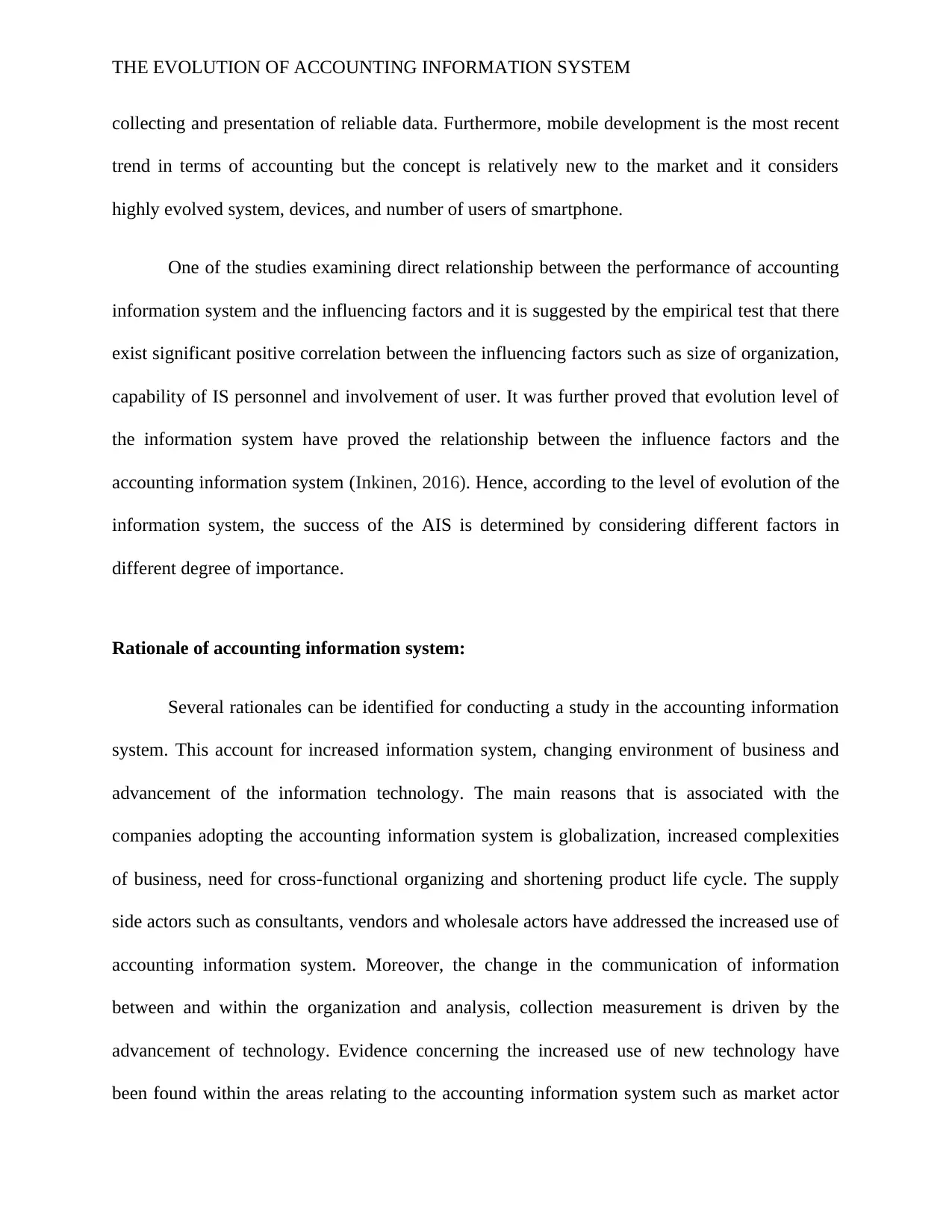
THE EVOLUTION OF ACCOUNTING INFORMATION SYSTEM
collecting and presentation of reliable data. Furthermore, mobile development is the most recent
trend in terms of accounting but the concept is relatively new to the market and it considers
highly evolved system, devices, and number of users of smartphone.
One of the studies examining direct relationship between the performance of accounting
information system and the influencing factors and it is suggested by the empirical test that there
exist significant positive correlation between the influencing factors such as size of organization,
capability of IS personnel and involvement of user. It was further proved that evolution level of
the information system have proved the relationship between the influence factors and the
accounting information system (Inkinen, 2016). Hence, according to the level of evolution of the
information system, the success of the AIS is determined by considering different factors in
different degree of importance.
Rationale of accounting information system:
Several rationales can be identified for conducting a study in the accounting information
system. This account for increased information system, changing environment of business and
advancement of the information technology. The main reasons that is associated with the
companies adopting the accounting information system is globalization, increased complexities
of business, need for cross-functional organizing and shortening product life cycle. The supply
side actors such as consultants, vendors and wholesale actors have addressed the increased use of
accounting information system. Moreover, the change in the communication of information
between and within the organization and analysis, collection measurement is driven by the
advancement of technology. Evidence concerning the increased use of new technology have
been found within the areas relating to the accounting information system such as market actor
collecting and presentation of reliable data. Furthermore, mobile development is the most recent
trend in terms of accounting but the concept is relatively new to the market and it considers
highly evolved system, devices, and number of users of smartphone.
One of the studies examining direct relationship between the performance of accounting
information system and the influencing factors and it is suggested by the empirical test that there
exist significant positive correlation between the influencing factors such as size of organization,
capability of IS personnel and involvement of user. It was further proved that evolution level of
the information system have proved the relationship between the influence factors and the
accounting information system (Inkinen, 2016). Hence, according to the level of evolution of the
information system, the success of the AIS is determined by considering different factors in
different degree of importance.
Rationale of accounting information system:
Several rationales can be identified for conducting a study in the accounting information
system. This account for increased information system, changing environment of business and
advancement of the information technology. The main reasons that is associated with the
companies adopting the accounting information system is globalization, increased complexities
of business, need for cross-functional organizing and shortening product life cycle. The supply
side actors such as consultants, vendors and wholesale actors have addressed the increased use of
accounting information system. Moreover, the change in the communication of information
between and within the organization and analysis, collection measurement is driven by the
advancement of technology. Evidence concerning the increased use of new technology have
been found within the areas relating to the accounting information system such as market actor
⊘ This is a preview!⊘
Do you want full access?
Subscribe today to unlock all pages.

Trusted by 1+ million students worldwide
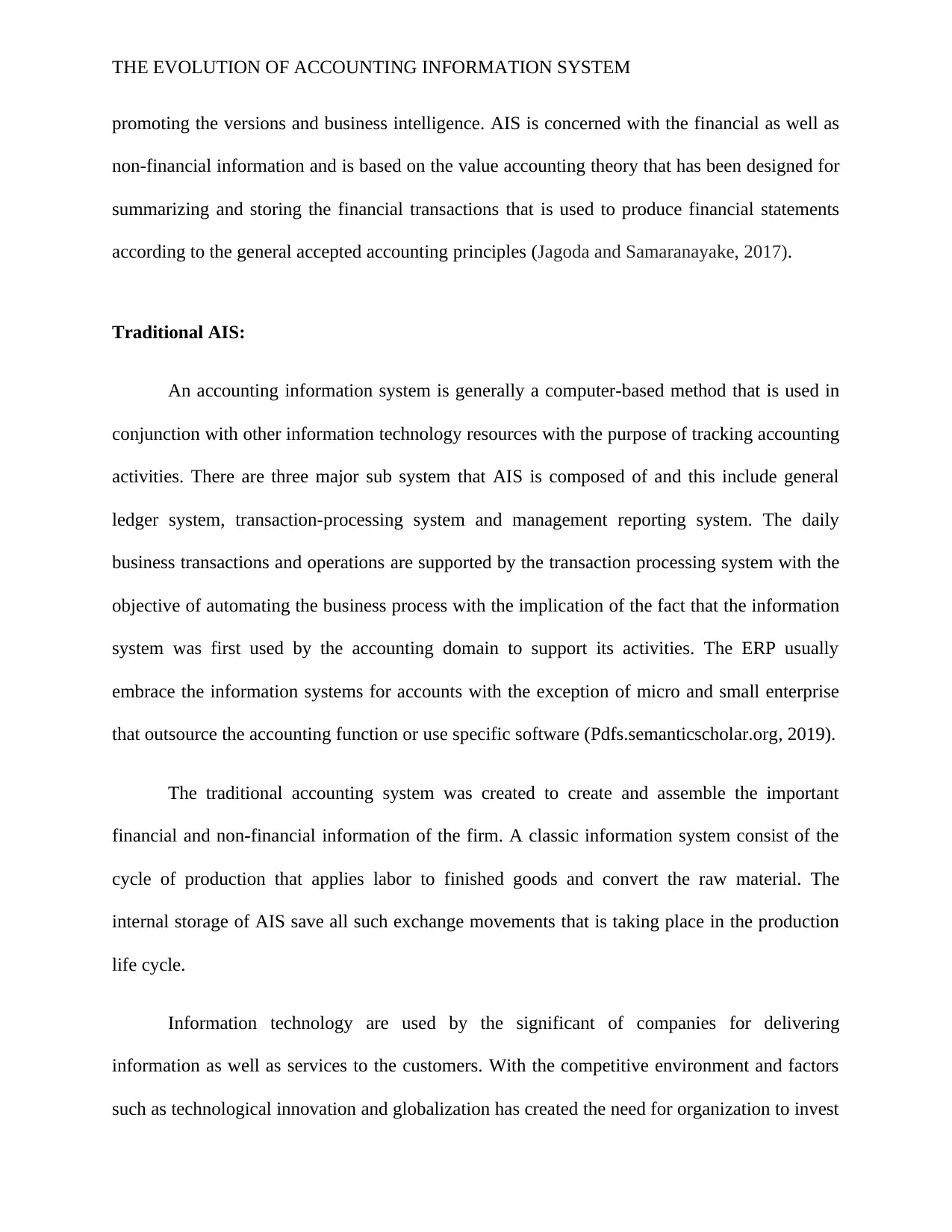
THE EVOLUTION OF ACCOUNTING INFORMATION SYSTEM
promoting the versions and business intelligence. AIS is concerned with the financial as well as
non-financial information and is based on the value accounting theory that has been designed for
summarizing and storing the financial transactions that is used to produce financial statements
according to the general accepted accounting principles (Jagoda and Samaranayake, 2017).
Traditional AIS:
An accounting information system is generally a computer-based method that is used in
conjunction with other information technology resources with the purpose of tracking accounting
activities. There are three major sub system that AIS is composed of and this include general
ledger system, transaction-processing system and management reporting system. The daily
business transactions and operations are supported by the transaction processing system with the
objective of automating the business process with the implication of the fact that the information
system was first used by the accounting domain to support its activities. The ERP usually
embrace the information systems for accounts with the exception of micro and small enterprise
that outsource the accounting function or use specific software (Pdfs.semanticscholar.org, 2019).
The traditional accounting system was created to create and assemble the important
financial and non-financial information of the firm. A classic information system consist of the
cycle of production that applies labor to finished goods and convert the raw material. The
internal storage of AIS save all such exchange movements that is taking place in the production
life cycle.
Information technology are used by the significant of companies for delivering
information as well as services to the customers. With the competitive environment and factors
such as technological innovation and globalization has created the need for organization to invest
promoting the versions and business intelligence. AIS is concerned with the financial as well as
non-financial information and is based on the value accounting theory that has been designed for
summarizing and storing the financial transactions that is used to produce financial statements
according to the general accepted accounting principles (Jagoda and Samaranayake, 2017).
Traditional AIS:
An accounting information system is generally a computer-based method that is used in
conjunction with other information technology resources with the purpose of tracking accounting
activities. There are three major sub system that AIS is composed of and this include general
ledger system, transaction-processing system and management reporting system. The daily
business transactions and operations are supported by the transaction processing system with the
objective of automating the business process with the implication of the fact that the information
system was first used by the accounting domain to support its activities. The ERP usually
embrace the information systems for accounts with the exception of micro and small enterprise
that outsource the accounting function or use specific software (Pdfs.semanticscholar.org, 2019).
The traditional accounting system was created to create and assemble the important
financial and non-financial information of the firm. A classic information system consist of the
cycle of production that applies labor to finished goods and convert the raw material. The
internal storage of AIS save all such exchange movements that is taking place in the production
life cycle.
Information technology are used by the significant of companies for delivering
information as well as services to the customers. With the competitive environment and factors
such as technological innovation and globalization has created the need for organization to invest
Paraphrase This Document
Need a fresh take? Get an instant paraphrase of this document with our AI Paraphraser
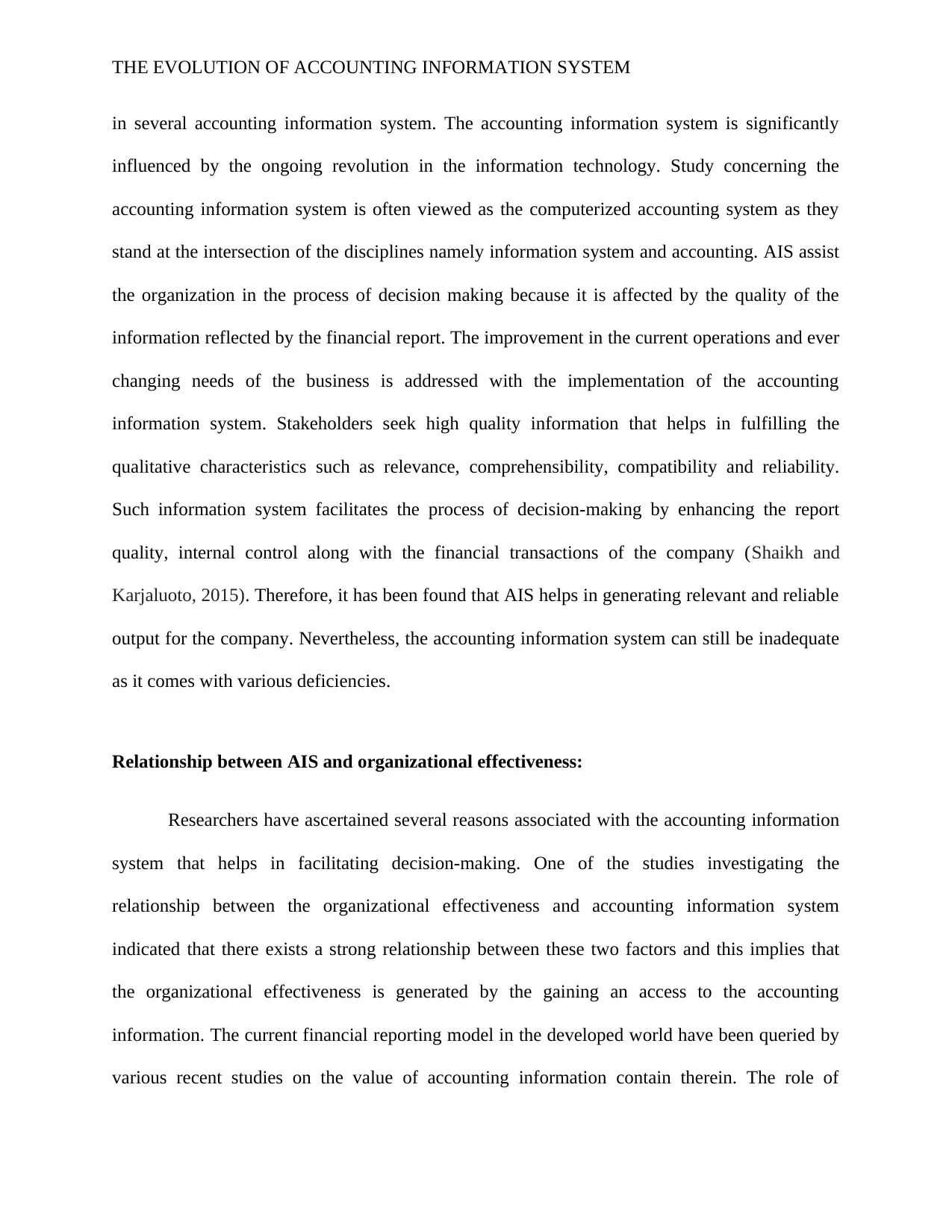
THE EVOLUTION OF ACCOUNTING INFORMATION SYSTEM
in several accounting information system. The accounting information system is significantly
influenced by the ongoing revolution in the information technology. Study concerning the
accounting information system is often viewed as the computerized accounting system as they
stand at the intersection of the disciplines namely information system and accounting. AIS assist
the organization in the process of decision making because it is affected by the quality of the
information reflected by the financial report. The improvement in the current operations and ever
changing needs of the business is addressed with the implementation of the accounting
information system. Stakeholders seek high quality information that helps in fulfilling the
qualitative characteristics such as relevance, comprehensibility, compatibility and reliability.
Such information system facilitates the process of decision-making by enhancing the report
quality, internal control along with the financial transactions of the company (Shaikh and
Karjaluoto, 2015). Therefore, it has been found that AIS helps in generating relevant and reliable
output for the company. Nevertheless, the accounting information system can still be inadequate
as it comes with various deficiencies.
Relationship between AIS and organizational effectiveness:
Researchers have ascertained several reasons associated with the accounting information
system that helps in facilitating decision-making. One of the studies investigating the
relationship between the organizational effectiveness and accounting information system
indicated that there exists a strong relationship between these two factors and this implies that
the organizational effectiveness is generated by the gaining an access to the accounting
information. The current financial reporting model in the developed world have been queried by
various recent studies on the value of accounting information contain therein. The role of
in several accounting information system. The accounting information system is significantly
influenced by the ongoing revolution in the information technology. Study concerning the
accounting information system is often viewed as the computerized accounting system as they
stand at the intersection of the disciplines namely information system and accounting. AIS assist
the organization in the process of decision making because it is affected by the quality of the
information reflected by the financial report. The improvement in the current operations and ever
changing needs of the business is addressed with the implementation of the accounting
information system. Stakeholders seek high quality information that helps in fulfilling the
qualitative characteristics such as relevance, comprehensibility, compatibility and reliability.
Such information system facilitates the process of decision-making by enhancing the report
quality, internal control along with the financial transactions of the company (Shaikh and
Karjaluoto, 2015). Therefore, it has been found that AIS helps in generating relevant and reliable
output for the company. Nevertheless, the accounting information system can still be inadequate
as it comes with various deficiencies.
Relationship between AIS and organizational effectiveness:
Researchers have ascertained several reasons associated with the accounting information
system that helps in facilitating decision-making. One of the studies investigating the
relationship between the organizational effectiveness and accounting information system
indicated that there exists a strong relationship between these two factors and this implies that
the organizational effectiveness is generated by the gaining an access to the accounting
information. The current financial reporting model in the developed world have been queried by
various recent studies on the value of accounting information contain therein. The role of
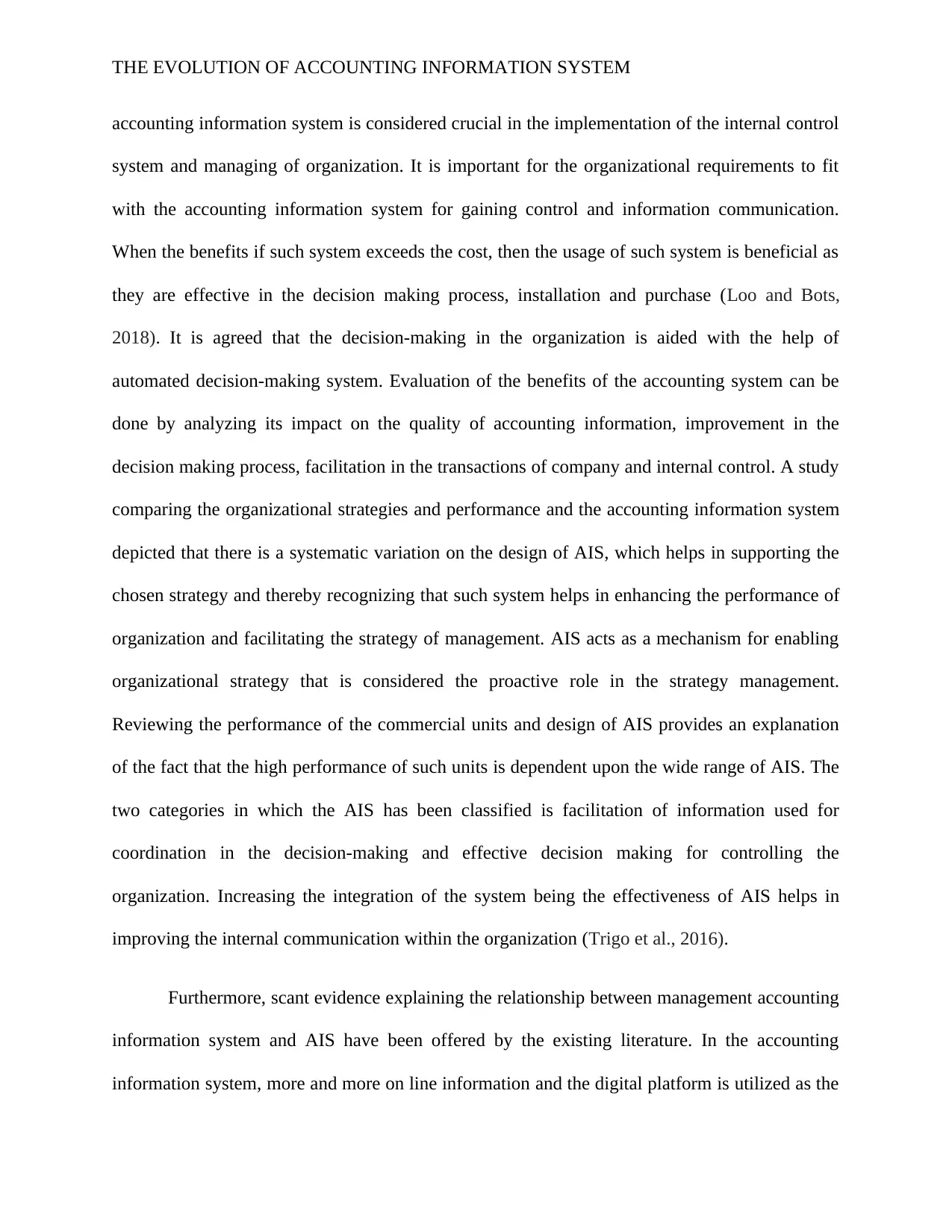
THE EVOLUTION OF ACCOUNTING INFORMATION SYSTEM
accounting information system is considered crucial in the implementation of the internal control
system and managing of organization. It is important for the organizational requirements to fit
with the accounting information system for gaining control and information communication.
When the benefits if such system exceeds the cost, then the usage of such system is beneficial as
they are effective in the decision making process, installation and purchase (Loo and Bots,
2018). It is agreed that the decision-making in the organization is aided with the help of
automated decision-making system. Evaluation of the benefits of the accounting system can be
done by analyzing its impact on the quality of accounting information, improvement in the
decision making process, facilitation in the transactions of company and internal control. A study
comparing the organizational strategies and performance and the accounting information system
depicted that there is a systematic variation on the design of AIS, which helps in supporting the
chosen strategy and thereby recognizing that such system helps in enhancing the performance of
organization and facilitating the strategy of management. AIS acts as a mechanism for enabling
organizational strategy that is considered the proactive role in the strategy management.
Reviewing the performance of the commercial units and design of AIS provides an explanation
of the fact that the high performance of such units is dependent upon the wide range of AIS. The
two categories in which the AIS has been classified is facilitation of information used for
coordination in the decision-making and effective decision making for controlling the
organization. Increasing the integration of the system being the effectiveness of AIS helps in
improving the internal communication within the organization (Trigo et al., 2016).
Furthermore, scant evidence explaining the relationship between management accounting
information system and AIS have been offered by the existing literature. In the accounting
information system, more and more on line information and the digital platform is utilized as the
accounting information system is considered crucial in the implementation of the internal control
system and managing of organization. It is important for the organizational requirements to fit
with the accounting information system for gaining control and information communication.
When the benefits if such system exceeds the cost, then the usage of such system is beneficial as
they are effective in the decision making process, installation and purchase (Loo and Bots,
2018). It is agreed that the decision-making in the organization is aided with the help of
automated decision-making system. Evaluation of the benefits of the accounting system can be
done by analyzing its impact on the quality of accounting information, improvement in the
decision making process, facilitation in the transactions of company and internal control. A study
comparing the organizational strategies and performance and the accounting information system
depicted that there is a systematic variation on the design of AIS, which helps in supporting the
chosen strategy and thereby recognizing that such system helps in enhancing the performance of
organization and facilitating the strategy of management. AIS acts as a mechanism for enabling
organizational strategy that is considered the proactive role in the strategy management.
Reviewing the performance of the commercial units and design of AIS provides an explanation
of the fact that the high performance of such units is dependent upon the wide range of AIS. The
two categories in which the AIS has been classified is facilitation of information used for
coordination in the decision-making and effective decision making for controlling the
organization. Increasing the integration of the system being the effectiveness of AIS helps in
improving the internal communication within the organization (Trigo et al., 2016).
Furthermore, scant evidence explaining the relationship between management accounting
information system and AIS have been offered by the existing literature. In the accounting
information system, more and more on line information and the digital platform is utilized as the
⊘ This is a preview!⊘
Do you want full access?
Subscribe today to unlock all pages.

Trusted by 1+ million students worldwide
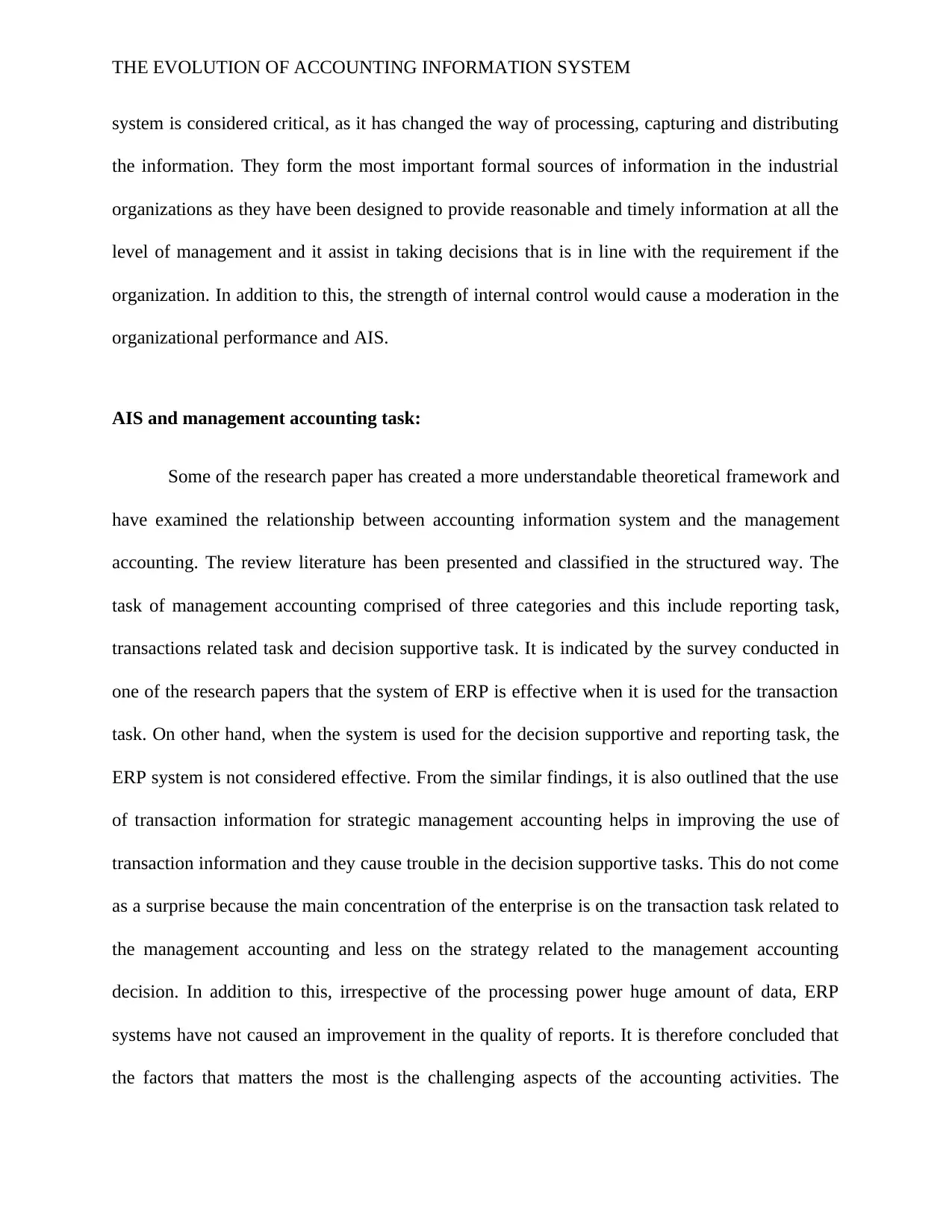
THE EVOLUTION OF ACCOUNTING INFORMATION SYSTEM
system is considered critical, as it has changed the way of processing, capturing and distributing
the information. They form the most important formal sources of information in the industrial
organizations as they have been designed to provide reasonable and timely information at all the
level of management and it assist in taking decisions that is in line with the requirement if the
organization. In addition to this, the strength of internal control would cause a moderation in the
organizational performance and AIS.
AIS and management accounting task:
Some of the research paper has created a more understandable theoretical framework and
have examined the relationship between accounting information system and the management
accounting. The review literature has been presented and classified in the structured way. The
task of management accounting comprised of three categories and this include reporting task,
transactions related task and decision supportive task. It is indicated by the survey conducted in
one of the research papers that the system of ERP is effective when it is used for the transaction
task. On other hand, when the system is used for the decision supportive and reporting task, the
ERP system is not considered effective. From the similar findings, it is also outlined that the use
of transaction information for strategic management accounting helps in improving the use of
transaction information and they cause trouble in the decision supportive tasks. This do not come
as a surprise because the main concentration of the enterprise is on the transaction task related to
the management accounting and less on the strategy related to the management accounting
decision. In addition to this, irrespective of the processing power huge amount of data, ERP
systems have not caused an improvement in the quality of reports. It is therefore concluded that
the factors that matters the most is the challenging aspects of the accounting activities. The
system is considered critical, as it has changed the way of processing, capturing and distributing
the information. They form the most important formal sources of information in the industrial
organizations as they have been designed to provide reasonable and timely information at all the
level of management and it assist in taking decisions that is in line with the requirement if the
organization. In addition to this, the strength of internal control would cause a moderation in the
organizational performance and AIS.
AIS and management accounting task:
Some of the research paper has created a more understandable theoretical framework and
have examined the relationship between accounting information system and the management
accounting. The review literature has been presented and classified in the structured way. The
task of management accounting comprised of three categories and this include reporting task,
transactions related task and decision supportive task. It is indicated by the survey conducted in
one of the research papers that the system of ERP is effective when it is used for the transaction
task. On other hand, when the system is used for the decision supportive and reporting task, the
ERP system is not considered effective. From the similar findings, it is also outlined that the use
of transaction information for strategic management accounting helps in improving the use of
transaction information and they cause trouble in the decision supportive tasks. This do not come
as a surprise because the main concentration of the enterprise is on the transaction task related to
the management accounting and less on the strategy related to the management accounting
decision. In addition to this, irrespective of the processing power huge amount of data, ERP
systems have not caused an improvement in the quality of reports. It is therefore concluded that
the factors that matters the most is the challenging aspects of the accounting activities. The
Paraphrase This Document
Need a fresh take? Get an instant paraphrase of this document with our AI Paraphraser
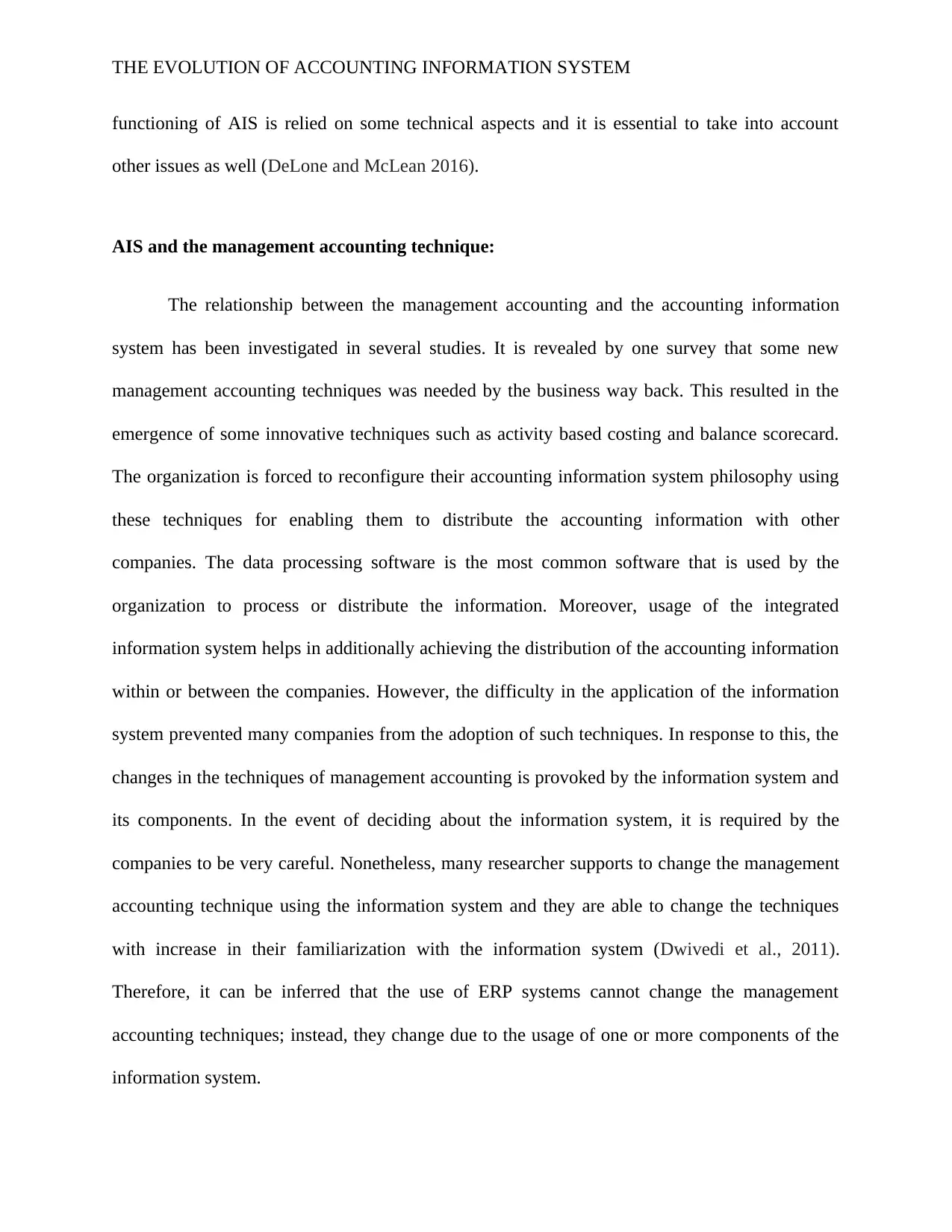
THE EVOLUTION OF ACCOUNTING INFORMATION SYSTEM
functioning of AIS is relied on some technical aspects and it is essential to take into account
other issues as well (DeLone and McLean 2016).
AIS and the management accounting technique:
The relationship between the management accounting and the accounting information
system has been investigated in several studies. It is revealed by one survey that some new
management accounting techniques was needed by the business way back. This resulted in the
emergence of some innovative techniques such as activity based costing and balance scorecard.
The organization is forced to reconfigure their accounting information system philosophy using
these techniques for enabling them to distribute the accounting information with other
companies. The data processing software is the most common software that is used by the
organization to process or distribute the information. Moreover, usage of the integrated
information system helps in additionally achieving the distribution of the accounting information
within or between the companies. However, the difficulty in the application of the information
system prevented many companies from the adoption of such techniques. In response to this, the
changes in the techniques of management accounting is provoked by the information system and
its components. In the event of deciding about the information system, it is required by the
companies to be very careful. Nonetheless, many researcher supports to change the management
accounting technique using the information system and they are able to change the techniques
with increase in their familiarization with the information system (Dwivedi et al., 2011).
Therefore, it can be inferred that the use of ERP systems cannot change the management
accounting techniques; instead, they change due to the usage of one or more components of the
information system.
functioning of AIS is relied on some technical aspects and it is essential to take into account
other issues as well (DeLone and McLean 2016).
AIS and the management accounting technique:
The relationship between the management accounting and the accounting information
system has been investigated in several studies. It is revealed by one survey that some new
management accounting techniques was needed by the business way back. This resulted in the
emergence of some innovative techniques such as activity based costing and balance scorecard.
The organization is forced to reconfigure their accounting information system philosophy using
these techniques for enabling them to distribute the accounting information with other
companies. The data processing software is the most common software that is used by the
organization to process or distribute the information. Moreover, usage of the integrated
information system helps in additionally achieving the distribution of the accounting information
within or between the companies. However, the difficulty in the application of the information
system prevented many companies from the adoption of such techniques. In response to this, the
changes in the techniques of management accounting is provoked by the information system and
its components. In the event of deciding about the information system, it is required by the
companies to be very careful. Nonetheless, many researcher supports to change the management
accounting technique using the information system and they are able to change the techniques
with increase in their familiarization with the information system (Dwivedi et al., 2011).
Therefore, it can be inferred that the use of ERP systems cannot change the management
accounting techniques; instead, they change due to the usage of one or more components of the
information system.
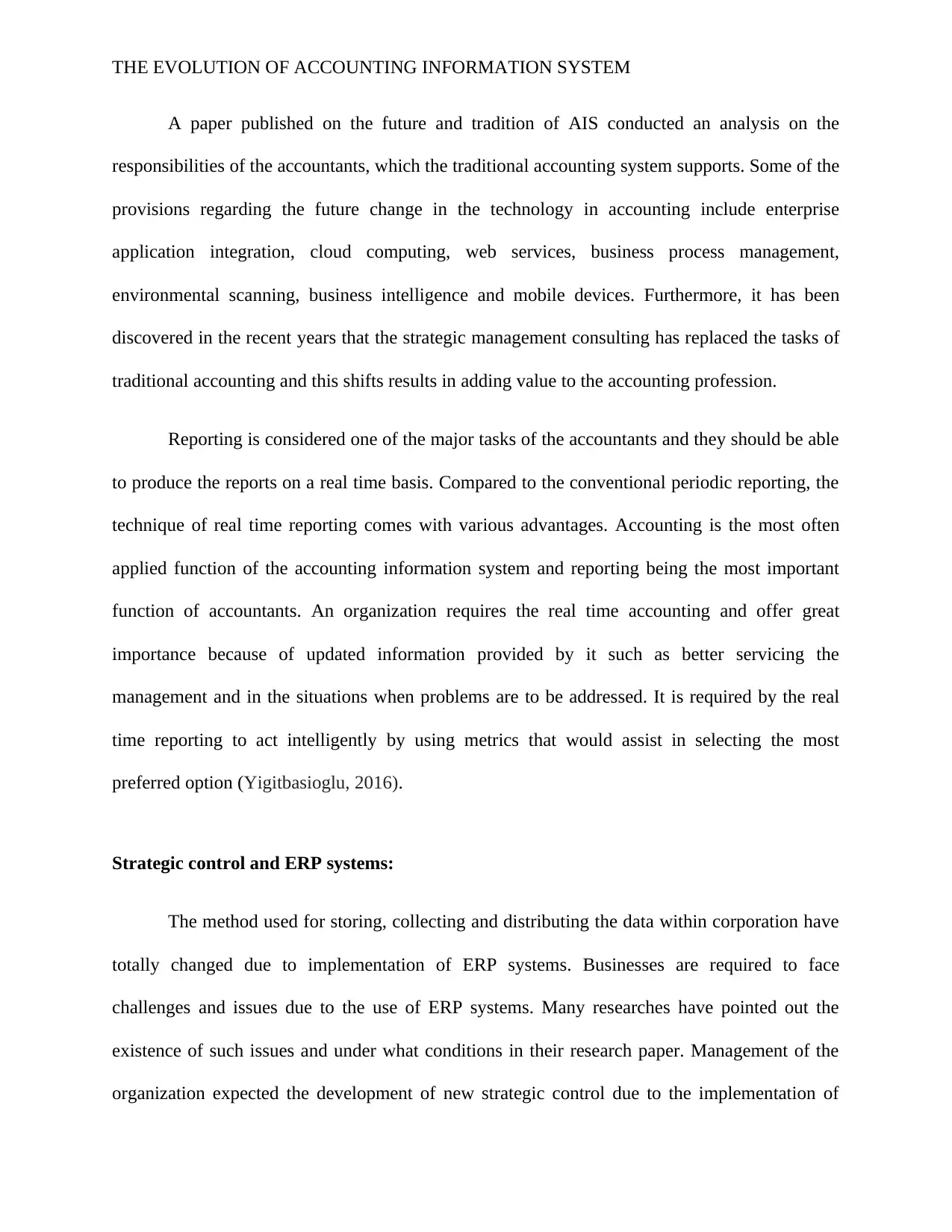
THE EVOLUTION OF ACCOUNTING INFORMATION SYSTEM
A paper published on the future and tradition of AIS conducted an analysis on the
responsibilities of the accountants, which the traditional accounting system supports. Some of the
provisions regarding the future change in the technology in accounting include enterprise
application integration, cloud computing, web services, business process management,
environmental scanning, business intelligence and mobile devices. Furthermore, it has been
discovered in the recent years that the strategic management consulting has replaced the tasks of
traditional accounting and this shifts results in adding value to the accounting profession.
Reporting is considered one of the major tasks of the accountants and they should be able
to produce the reports on a real time basis. Compared to the conventional periodic reporting, the
technique of real time reporting comes with various advantages. Accounting is the most often
applied function of the accounting information system and reporting being the most important
function of accountants. An organization requires the real time accounting and offer great
importance because of updated information provided by it such as better servicing the
management and in the situations when problems are to be addressed. It is required by the real
time reporting to act intelligently by using metrics that would assist in selecting the most
preferred option (Yigitbasioglu, 2016).
Strategic control and ERP systems:
The method used for storing, collecting and distributing the data within corporation have
totally changed due to implementation of ERP systems. Businesses are required to face
challenges and issues due to the use of ERP systems. Many researches have pointed out the
existence of such issues and under what conditions in their research paper. Management of the
organization expected the development of new strategic control due to the implementation of
A paper published on the future and tradition of AIS conducted an analysis on the
responsibilities of the accountants, which the traditional accounting system supports. Some of the
provisions regarding the future change in the technology in accounting include enterprise
application integration, cloud computing, web services, business process management,
environmental scanning, business intelligence and mobile devices. Furthermore, it has been
discovered in the recent years that the strategic management consulting has replaced the tasks of
traditional accounting and this shifts results in adding value to the accounting profession.
Reporting is considered one of the major tasks of the accountants and they should be able
to produce the reports on a real time basis. Compared to the conventional periodic reporting, the
technique of real time reporting comes with various advantages. Accounting is the most often
applied function of the accounting information system and reporting being the most important
function of accountants. An organization requires the real time accounting and offer great
importance because of updated information provided by it such as better servicing the
management and in the situations when problems are to be addressed. It is required by the real
time reporting to act intelligently by using metrics that would assist in selecting the most
preferred option (Yigitbasioglu, 2016).
Strategic control and ERP systems:
The method used for storing, collecting and distributing the data within corporation have
totally changed due to implementation of ERP systems. Businesses are required to face
challenges and issues due to the use of ERP systems. Many researches have pointed out the
existence of such issues and under what conditions in their research paper. Management of the
organization expected the development of new strategic control due to the implementation of
⊘ This is a preview!⊘
Do you want full access?
Subscribe today to unlock all pages.

Trusted by 1+ million students worldwide
1 out of 20
Related Documents
Your All-in-One AI-Powered Toolkit for Academic Success.
+13062052269
info@desklib.com
Available 24*7 on WhatsApp / Email
![[object Object]](/_next/static/media/star-bottom.7253800d.svg)
Unlock your academic potential
Copyright © 2020–2026 A2Z Services. All Rights Reserved. Developed and managed by ZUCOL.





